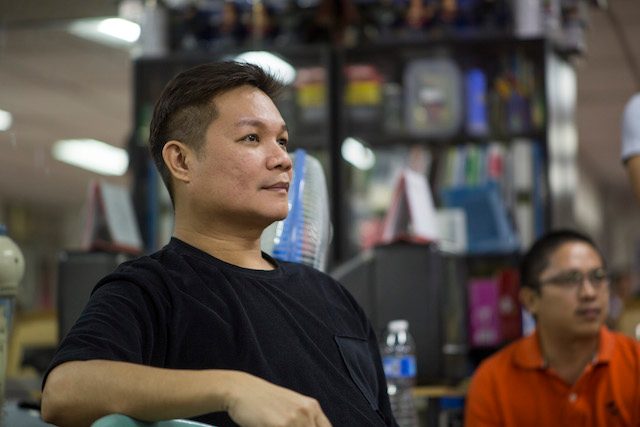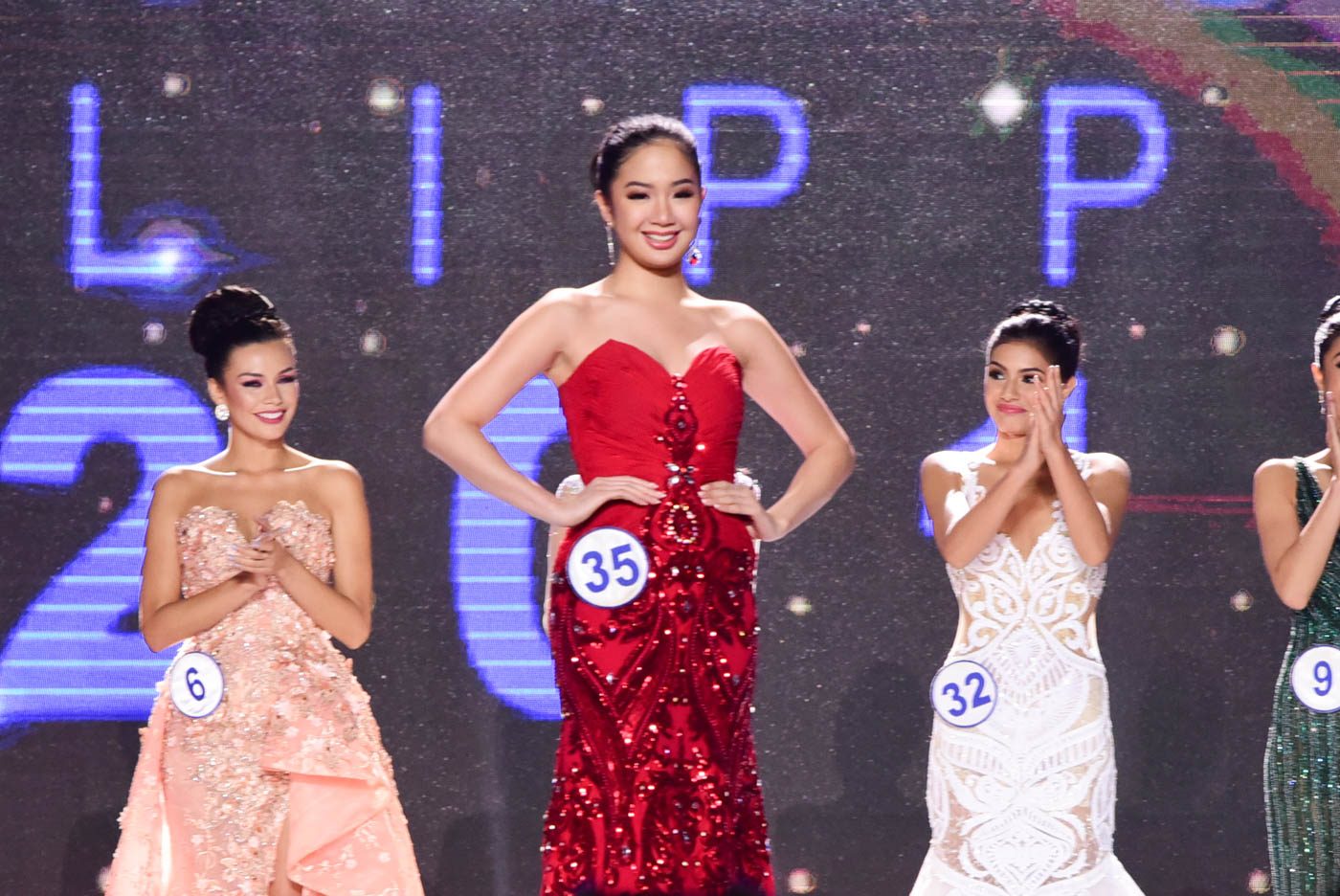SUMMARY
This is AI generated summarization, which may have errors. For context, always refer to the full article.

This compilation was migrated from our archives
Visit the archived version to read the full article.
AT A GLANCE
- From Part 1: Feminists say the country’s obsession with beauty pageants is harmful to women, because they encourage women to measure their worth by their physical attributes
- Defenders say pageants are a platform for women to do good and promote an advocacy, and that the technicalities of walking and answering Q&A are hard-earned skills
- Pageants are not likely to disappear, anytime soon
CONCLUSION
READ Part 1: The Philippines’ beauty pageant obsession: Who benefits?
MANILA, Philippines – On the 2nd floor of a decrepit building in Mandaluyong City, inside a small and modest dance studio, Bruno Mars’ Versace on the Floor is blaring.
But there is no dancing.
One young woman sits on a chair as a hairdresser curls her tresses. Another steps into a long gown. Still another is preoccupied with retouching her make-up, pursing her lips as she applies a layer of color.
There are less than 10 of them in the room, all in high heels, smoothing their dresses, running their fingers through their hair, making sure they look picture perfect.
The women wait for their turn at the back of the room. For now, it is Laura Lehmann’s turn.
Lehmann, 23, stands 5 feet 7 inches tall. She puts her chin up and walks slowly, deliberately down the center of the room, her long straight hair down her back. She wears a big smile on her face – even if it’s the 6th time she has had to do the same thing.
Head trainer Jonas Gaffud watches her intently, his sharp eyes boring into hers, as he stands in a corner of the room scrutinizing Lehmann’s every step, every movement, every sway of the arm.
He furrows his brows and frowns. He stops her midway.
“You look so dead,” he barks at her. “Again!”
Lehmann says nothing. She nods, gathers her gown, and walks back towards the starting spot.
Again, she puts her chin up and walks slowly, deliberately down the center of the room.
Again, she wears a big smile – even if she has spent her whole Sunday here including a morning practicing her Q&A as she has for the past few months, and even if Bruno Mars is playing on loop over and over throughout walking practice.
For a chance to win the Miss World Philippines crown, she practices her walk. Again.
Before joining pageants, Lehmann wanted to become a doctor.
She was studying neuroscience psychology with a minor in Spanish, through a scholarship at a university in Los Angeles.
But all that changed in 2014, when over Christmas break, a family friend suggested she join the country’s biggest pageant, Binibining Pilipinas.
“I was kind of skeptical at first but then after a while, I think to me, I took it as an opportunity to also come back home,” she told Rappler. “So that’s why I joined.”
Lehmann was 1st runner up, even with no prior experience. Although it of course helped that she is of mixed blood, tall, model-thin, and fair-skinned, with long, straight hair.
Despite not taking home the top prize, her high finish opened up doors for the university student – as beauty pageants do in the Philippines. She became a courtside reporter for a university sports league, and later, a television travel host.
She herself realizes that her path changed from medicine to what it is now, a transition triggered by her first pageant.
In 2017, she decided to return to competition, this time for Miss World Philippines, attracted by the pageant’s “beauty with a purpose” focus.
Lehmann, a former athlete and consistent honor student, is not oblivious to the criticism of beauty pageants.
“When you don’t know a lot about pageants, a lot of people think it’s just the objectification of women… puro ganda lang (it’s all physical)”
– Laura Lehmann, Miss World Philippines 2017
Feminists argue pageants have no place in today’s world, since judging women solely by their faces and bodies is outdated and objectifies them. It teaches women that their worth is measured by their looks, they say, and reiterates the wrong idea that women must be beautiful to earn status and power.
“I think to be honest I was victim to the stereotype as well,” Lehmann said. “When you don’t know a lot about pageants, a lot of people think it’s just the objectification of women, it’s all about beauty and parading your looks and puro ganda lang (it’s all physical).”
“But what’s nice about it, when I entered the world of pageants, I saw what it was really like. It’s really a technique. People really put their hearts into it. You have mentors who teach us how to walk well. How to speak well. How to dress appropriately. And how to prepare yourself for pageants.”
She said that staying calm under pressure – like thinking of an eloquent answer on the spot, or keeping composure in front of tens of thousands of people in a live audience – requires practice and confidence. It isn’t an easy task.
Even the swimsuit competition, condemned by feminists as merely a display of their bodies, can be a form of empowerment, according to Lehmann.

“I can see why people condemn it because you’re showing off your figure, and if you’re blessed with a better figure you obviously have an advantage over other women,” she said.
“But at the same time I like it because I think it’s also a parade of being fit. It kind of celebrates your fitness because to prepare for a swimsuit competition it’s not just about having a blessed body, it’s also about going to the gym every day, and not eating that piece of chocolate cake that you would’ve wanted to eat. So I think it’s about discipline and that’s what I like about it.”
How about young Filipinas, who see the unrealistic standards set by beauty queens as the ideal aspiration? Is this not damaging to them?
“It’s more of teaching women to be confident in themselves, and to have a mind, have a voice, to be confident to speak out what they really have to say,” she said.
Lehmann doesn’t crack from the constant barrage of questions about pageantry and its harmful effects on women – insisting the two are not mutually exclusive.
It turns out to be good practice.
A few weeks later, she won Miss World Philippines after answering the question, “There are people who do not believe that pageants are there to empower women, what would you say to them?”
Her response was consistent.
“To anyone who doesn’t believe in pageants, I would ask them to take a look at the girls we have on stage tonight, because we had lawyers, we had architects, we have women of substance who were here today not only because of what they look like but because of what’s in their heart, what’s in their mind and because they have brought forth beauty with a purpose projects.”
“They’re here fighting to represent the Philippines and become the best version of a Filipina and to me that is only something to celebrate not protest.”
In Gaffud’s Makati office, guests are ushered through a hallway, one wall lined with shelves and shelves of black and white portraits.
The photos are of stunning men and women, mostly models, some beauty queens – all of whom he had taken under his wing either through his modeling agency Mercator, or through Aces and Queens, his pro bono pageant training camp.
Gaffud knows the ins and outs of beauty pageants: the hair, the make-up, the gown, the walk. He trained his first queen 17 years ago, when he was just fresh out of college.

Today, he is a sought-after expert, even publishing a book for aspiring beauty queens.
Almost two decades later, he has produced a slew of international beauty queens, most recently Miss International 2016 Kylie Verzosa, Miss Universe 2015 Pia Wurtzbach, and Miss World 2013 Megan Young – making Aces and Queens the first training camp to produce winners in each of the Big 3, known as the most prestigious pageants.
He is also frank about the reality of pageants: only few are worthy.
“In the world of beauty pageants, you have to be physically beautiful,” he said.
“At the end of the day, we talk to the [girls] one on one and we tell them that when they win, they should use that crown to do something for humanity. That’s cliché… for some people. But it’s real. We do that.”
– Jonas Gaffud
Beauty can be “subjective” and different cultures may have different preferences, he said, “but somehow, there are standards that you have a nice face. Like a nice smile or a nice nose or nice eyes, or the way you fix your hair.”
But even this is not enough.
“You know, there are a lot of beautiful people who join beauty pageants. But what’s important is the aura,” he said. “That’s the aura that comes from the inside. It radiates. It shines. If modeling has the X factor, it’s aura for the beauty queens.”
Standards are admittedly high but Gaffud does not think this is harmful to women – because he believes the positive impact of pageants is greater than their being detrimental.
To Gaffud, this is why he does what he does: he helps women make it to the top, so they can effect change. He chooses women who, aside from their looks, can influence people.
“I don’t think it’s harmful,” he said. “At the end of the day, we talk to the [girls] one on one and we tell them that when they win, they should use that crown to do something for humanity. That’s cliché, huh, for some people. But it’s real. We do that.”
He cited examples: Pia Wurtzbach has continued her HIV advocacy beyond her Miss Universe reign. Zorayda Andam, the first girl he ever trained, is a lawyer. Venus Raj, Miss Universe 2010, holds a master’s degree in community development.
He said these women prove that the beauty queens who win, are inspiring beyond just their looks.

“The impact of beauty queens, no matter how small or big you are, is you become a symbol of hope. You become that person that people look up to. Even in the province, everyone will watch Miss Barangay, Miss Town Fiesta,” said Gaffud.
“People don’t know the hard work they put into it, how they get ridiculed, how I feel bad for them. But at the end of the day, you get a crown, you win, and suddenly you’re a beacon of hope for everyone. So that’s the impact.”
Again, Wurtzbach was raised as a poster child – the beauty queen who tried 3 times until she finally won Miss Universe Philippines, and eventually, Miss Universe.
To Gaffud, training these women is his way of giving back to the country, knowing that a win in international pageants lifts the spirits of Filipinos, and opens up doors for Filipina women to promote advocacies.
Like Wurtzbach who has since become a UNAIDS Goodwill Ambassador. Or Young, who was recently introduced as one of the ambassadors of Smile Train, the world’s largest cleft charity.
This is why he does it without asking for anything in return – except perhaps an end to the trolling of the trainers and the contestants, and the bickering with fans from other countries.
As for those who think beauty pageants are sexist spectacles?
“Don’t watch. I find boxing very bloody and I don’t watch.”
Lehmann landed in the Top 40 of Miss World 2017 but didn’t win the crown.
Impassioned Filipino fans cried foul, flooding Twitter with accusations of Miss World’s perceived bias, even directly tweeting the pageant organizer to air their grievances and threatening to boycott the contest.
But in her Instagram post upon her return to the Philippines, Lehmann – who was among those who won Miss World’s Beauty with a Purpose challenge for her advocacy to create a milk bank for a pediatric ward at a Manila hospital – reminded followers to stop the bickering, saying that the advocacy element was “really the reason I chose to join Miss World.”
Dr Mina Roces, a historian at the University of New South Wales, discussed with Rappler the harmful effects of beauty pageants in Part 1. She said that the power that women receive after pageants is hard to deny.
This power and status, she said, when used for good, is perhaps one way to justify pageantry.
“As a feminist, I would say that anything that gives women power, I think, we should rethink. And not dismiss,” she said, especially in a male-dominated world.
She also pointed out that beauty pageants in the Philippines cut across classes so that women from the provinces, or the poor, can gain power that is normally hard to attain.

But still, these benefits and opportunities are open only to a few: those who fit the standards of beauty dictated by a patriarchal society. And does it not teach young women to aspire for the wrong things, if being a beauty queen is their perceived way out of poverty?
Roces admitted this was one of her concerns about pageantry: the overemphasis on physical beauty could mean women focus their efforts on looking good “rather than reading books or being involved in some sort of hobby that you can succeed in or having other interests outside from developing the physical side of you.”
It is clear that beauty pageants are not disappearing anywhere, anytime soon – especially in the Philippines. They will, for a long time, continue to serve as entertainment and inspiration to many Filipinos, as Roces emphasized in Part 1.
While it may take generations to change Filipinos’ culturally embedded fixation with beauty, however, pageant advocates argue that beauty contests – aware of the criticisms – are themselves progressing.
“Pageants are evolving and it is no longer just about the looks and the body,” said Ric Galvez, founder of leading pageant website Missosology, which started almost 20 years ago in 1999. “It is now more about attitude and intellect.”
“Beauty with a purpose is the byword in pageantry nowadays.”
Recent pageant results may prove him right.
Sophia Senoron, 17 – whose advocacy is to train student leaders – was a surprise winner at Miss World Philippines in 2017 when she took home the Miss Multinational Philippines crown.

“Possibly the biggest surprise of the night came in a small package,” wrote pageant analyst and Rappler contributor Voltaire Tayag.
“There was never any doubt on Sophia’s ability to speak with substance and maturity beyond her age. But she is only 5’4”, which is very short by pageant standards. In fact, her height won’t even qualify her to apply in other national pageants.”
Tayag then called her pageant journey “an amazing story of perseverance and determination.”
“Pageants are evolving and it is no longer just about the looks and the body… It is now more about attitude and intellect.”
– Ric Galvez, founder of pageant website Missosology
“She was the very definition of the underdog who overcame the odds to win. In my previous interview with Sophia, she said that she became an independent candidate because she wanted to prove that women do not need to be ‘trained’ or ‘made to become a beauty queen.’ In fact, she was very candid in saying that she cut ties with her former handler because he did not believe she could win a crown.”
Fittingly, Seronon during her Q&A, was asked what advice she would give a 7-year-old girl who dreams of becoming a beauty queen.
With confidence, Seronon answered, “I think at a young age, we start our aspirations of what we want to be in life. That’s something I’ve experienced being 17 years old and making it this far. I would tell the 7-year-old not to make the pageant her goal but to make what she wants to do with the pageant her destination.”
“I’m talking about wanting to be able to help the world and show the world – [what] our country can and should be, or what our country can do for other people and for our future as well. And I think that’s a goal that all beauty queens should have.”
Indeed, for now, pageants are stepping stones for women to be influential, powerful, and to have a voice. But perhaps what our country should be, is one where 7-year-olds believe they can wield power and be heard, even without a crown. – Rappler.com
Add a comment
How does this make you feel?
![[Closer Look] Homophobic frenzy diverts attention from POGO dangers](https://www.rappler.com/tachyon/2024/06/harry-roque-homophobia-targt-pogo-june-18-2024.jpg?resize=257%2C257&crop_strategy=attention)

![[VIDEO EDITORIAL] Sanlibo’t isang laslas mula sa ‘Eat Bulaga’ at Tito, Vic, and Joey](https://www.rappler.com/tachyon/2023/06/video-editorial-tvj.jpg?resize=257%2C257&crop=407px%2C0px%2C1080px%2C1080px)
![[EDITORIAL] Sanlibo’t isang laslas mula sa ‘Eat Bulaga’ at Tito, Vic, and Joey](https://www.rappler.com/tachyon/2023/06/animated-Tape-ousts-TVJ-Eat-Bulaga-carousel.jpg?resize=257%2C257&crop=251px%2C0px%2C720px%2C720px)
There are no comments yet. Add your comment to start the conversation.